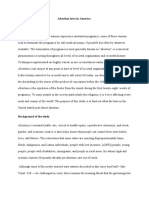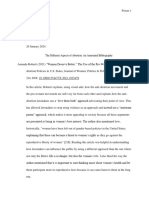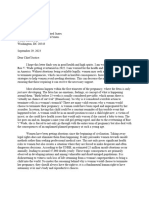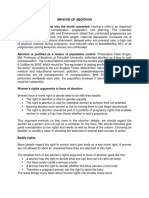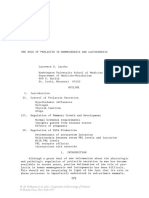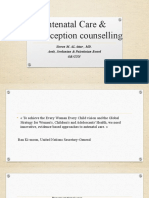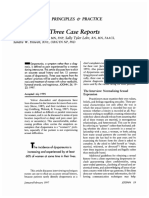The Impact and Nationwide Issues of Abortion
Ella Vujovic
Imagine this: you’re a 15-year-old girl in a low-income household. You became a victim of sexual assault
that led to an unwanted pregnancy. You aren’t emotionally, financially, or physically prepared to have
this child but unfortunately, you live in Indiana. There are no in-state options available and traveling out
of state is out of your family's budget. This is just one example of countless women who have similar or
different stories in need of an abortion but can’t access it safely. In this blog, I will discuss statistics, my
personal opinions, the history of abortions, and why they need to be available to all women in the U.S.
Abortion has always been an opinion-heavy topic for multiple reasons, but the outlook has changed
throughout the years; for good and for bad. The Roe v. Wade decision by the Supreme Court in 1973
was the start of protection for women to have access to safe abortions. This decision also began a 50-
year battle between those who believe in the rights of women to choose and those who do not. This
constitutional right held firm in the United States until 2022 when the Supreme Court overturned Roe v.
Wade. States now have the option to allow abortion access or not. The trickle-down effect of this
decision has impacted women in many ways- from their healthcare decisions to insurance availability
and much more.
NPR shared a story about a woman who had extreme abdominal pain while on vacation. She ended up
losing blood internally and was suspected of having an ectopic pregnancy. The doctors had to rush her
into emergency after confirming the ectopic pregnancy. Texas now considers ectopic pregnancy
termination as an abortion. They also consider an abortion a felony. This woman could have been locked
away for years and years for trying to save her own life.
According to Harvard T.H Chan School of Public Health, “A recent study estimated that banning abortion
in the U.S. would lead to a 21% increase in the number of pregnancy-related deaths overall and a 33%
increase among Black women, simply because staying pregnant is more dangerous than having an
abortion.” This issue has forced women to go out of state to receive a safe abortion because of their own
state’s laws. The overturned ruling has also hurt the medical field. Physicians have had to make decisions
against their beliefs and the health of ``their patients but rather based on the state’s abortion
�status. CNN Health mentions “In Texas, where strict limitations on abortion took effect more than a year
ago, doctors fear criminal and civil prosecution if they offer termination before the mother is on the brink
of death.” Another big issue women face with restrictions to safe abortions is having to carry their child to
term even when the infant’s life or their own life is in danger. This subject is unfortunately very divided in
opinions even though it is a human right and should be seen as one. Reproductive rights should stand
with women and not the government.
The issues don’t stop with the health of women. There are major potential socioeconomic outcomes
that may be hurt because of the 2022 decision. There is an expectation that fewer women will
participate in higher education if they are forced to have children. Fewer women may enter the
workforce for the same reason. Women of color may be the hardest hit because of the decision as they
may have the most limited choices regarding childcare.
A popular counterargument to the legalization of abortion is that life begins at conception and
therefore abortion is murder. Typically, religion plays a big factor in their beliefs. This is why the topic of
abortion is very personal and polarizing. For abortion rights supporters, they think life doesn't begin until
birth. No scientific proof will diffuse the argument because it is mainly personal opinions and religious
beliefs.
We are too early to say what the implications may be to women and their families because of this
decision. What we do know today is that women of all ages must make choices and sacrifices because
they do not have 100% control of their bodies.
Citations
"‘Heartbreaking’ Stories Go Untold, Doctors Say, As Employers ‘Muzzle’ Them in Wake of Abortion
Ruling." CNN Health, 12 Oct. 2022,
www.cnn.com/2022/10/12/health/abortion-doctors-talking/index.html.
"The Negative Health Implications of Restricting Abortion Access." Harvard T.H Chan, 13 Dec. 2021,
www.hsph.harvard.edu/news/features/abortion-restrictions-health-implications/.
"New Abortion Laws Changed Their Lives. 8 Very Personal Stories." NPR, 23 Jun. 2023,
www.npr.org/sections/health-shots/2023/06/23/1183878942/abortion-bans-personal-stories-dobbs-
anniversary.





















